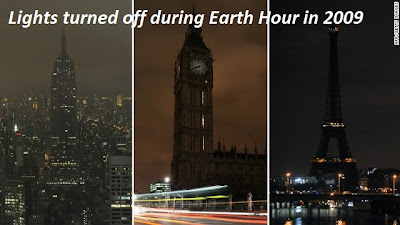 |
| Empire State Building in New York, Big Ben in London and the Eiffel Tower in Paris |
(CNN) -- On Saturday, European Space Agency astronaut and World Wildlife Fund ambassador André Kuipers will watch from the International Space Station as each time zone hits 8:30 p.m. -- and track to see who on Earth turns out the lights.
Kuipers will blog from 240 miles above the planet as part of the Earth Hour, an annual event that encourages homes, businesses and governments to turn off their lights for one hour to build awareness about energy use and climate change.
"We are living beyond our means. That is not sustainable," says Andy Ridley, co-founder and executive director of Earth Hour. "We want to unite people around the world to build a sustainable future."
The message seems to hit home. Earth Hour 2012 has commitments from individuals, companies and landmarks to switch off lights in 147 countries and territories and over 5,000 cities, organizers say.
Sydney's Opera House is scheduled to go dark, followed by Asian landmarks such as the Great Wall of China, the Tokyo Tower, Taipei 101 and the India Gate. In Dubai, the world's tallest building, the Burj Khalifa, will switch off its lights.
Other landmarks pledged to switch off: The Eiffel Tower in Paris, London's Big Ben, the Brandenburg Gate in Berlin, the Christ the Redeemer statue in Rio de Janeiro and the Empire State Building in New York.
Kuipers will watch the spectacle from orbit, sharing photos and live commentary on the event from space for the first time.
Taking place on the last Saturday each March, the numbers of people and countries participating has increased each year, Ridley says.
"It became easier than ever to connect people around the world," says Ridley. But Earth Hour's long term goal is to go "beyond the hour." For Ridley, the important question is not if action on climate change is happening, but "is it happening fast enough," he says.
"We need to move a lot further, faster and as soon as possible. That is the big challenge, that we all move and that the economies can adapt to the change."
Organized by the World Wildlife Fund, Earth Hour started in Sydney in 2007, when WWF-Australia encouraged 2.2 million individuals and more than 2,000 businessmen to turn off their lights for one hour to support action on climate change.
Kuipers will blog from 240 miles above the planet as part of the Earth Hour, an annual event that encourages homes, businesses and governments to turn off their lights for one hour to build awareness about energy use and climate change.
"We are living beyond our means. That is not sustainable," says Andy Ridley, co-founder and executive director of Earth Hour. "We want to unite people around the world to build a sustainable future."
The message seems to hit home. Earth Hour 2012 has commitments from individuals, companies and landmarks to switch off lights in 147 countries and territories and over 5,000 cities, organizers say.
Sydney's Opera House is scheduled to go dark, followed by Asian landmarks such as the Great Wall of China, the Tokyo Tower, Taipei 101 and the India Gate. In Dubai, the world's tallest building, the Burj Khalifa, will switch off its lights.
Other landmarks pledged to switch off: The Eiffel Tower in Paris, London's Big Ben, the Brandenburg Gate in Berlin, the Christ the Redeemer statue in Rio de Janeiro and the Empire State Building in New York.
Kuipers will watch the spectacle from orbit, sharing photos and live commentary on the event from space for the first time.
Taking place on the last Saturday each March, the numbers of people and countries participating has increased each year, Ridley says.
"It became easier than ever to connect people around the world," says Ridley. But Earth Hour's long term goal is to go "beyond the hour." For Ridley, the important question is not if action on climate change is happening, but "is it happening fast enough," he says.
"We need to move a lot further, faster and as soon as possible. That is the big challenge, that we all move and that the economies can adapt to the change."
Organized by the World Wildlife Fund, Earth Hour started in Sydney in 2007, when WWF-Australia encouraged 2.2 million individuals and more than 2,000 businessmen to turn off their lights for one hour to support action on climate change.
No comments:
Post a Comment